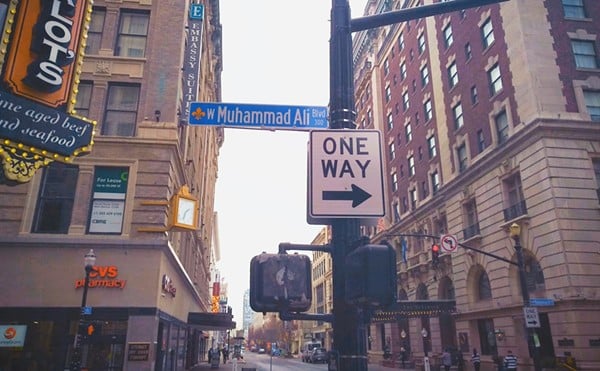Inbox, aka Erosia, has been an open forum for people to speak out on the issues of the day. Letters are sometimes angry, sometimes congratulatory and sometimes out of left field. Here are four gentlemen whose names you are familiar with if you spend any time on this page. They write often, adding their voices to a community dialogue that hopefully continues outside of these pages. LEO’s 20th anniversary issue wouldn’t be complete without their bylines. Thanks guys, and keep the letters coming.
Writing is Journaling
Congratulations, LEO, on reaching your 20-year anniversary of publishing a free weekly paper. Your success is largely attributable to the many people in Louisville’s greater metropolitan area who look forward to picking up a copy each week.
It is often said that one of the most-read sections of newspapers is Letters to the Editor. Thank you, LEO, for publishing so many of my letters over the years.
I wrote my first letter to The Courier-Journal in 1975 when I was 37 years old, my second one in 1979, and since 1980, an estimated 2,000 more. An estimated 600-plus letters have been published in our nation’s newspapers and magazines. You can see I’ve spent a lot of time the past 30 years writing concise, to-the-point opinion compositions.
I consider my writing a calling; I believe I was meant to be a writer of letters to the editor. I enjoy the process of sitting down, thinking and composing them, not knowing what I’m going to write when I first sit down at the keyboard.
Most of my letters are written in response to current events. Even though I know God is neither Democrat nor Republican, I do not apologize for the liberal Democratic bias my letters, written from a “regular” citizen’s viewpoint, contain. I’ve written about racism, civil rights, black history, greed, war and peace, politics, the death penalty, world hunger, justice for the poor, gun control, the arms race, baseball, heroes Jackie Robinson, Martin Luther King Jr., etc.
Writing letters does more for me than for the readers. It offers a rather quiet, retiring person an opportunity for self-expression and creativity; it is my way of journaling. I am not a Bible scholar or any other kind of scholar, but I know my upbringing in the church and life experiences impact what I write. I hope the words I string together in a letter please God.
My scholarly dad, Gordon Craig Whiteley Sr., a Baptist minister who greatly influenced my life, was a prolific writer of letters to the editor. He died in 1956, when I was a college freshman, so he didn’t get to see his son follow in his letter-writing footsteps. I am compiling all of my published letters in chronological order to give to my children and grandchildren. I want to pass the letters on to them. Perhaps one or more of them will feel led, sometime during their lifetime, to write letters to the editor.
Paul L. Whiteley Sr., St. Matthews
Filling My Void
While I worked as a reporter in the mid-1980s for The Corydon Democrat, a fine weekly newspaper in the seat of growing Harrison County, Ind., I was blessed to be asked to write opinion pieces for the editorial section.
On days when I lacked the energy or inclination to produce the pieces, managing editor Randy West, who this year was inducted into the Indiana Journalism Hall of Fame, would pull out a Courier-Journal and read to me something James Watt had said that week. Or Ed Meese. Or the Gipper himself.
Suddenly, I would be inspired. And 15 minutes later, I would send Randy an opinion piece (not, strictly speaking, an “editorial,” because the management of the paper didn’t write it) about the criminality of the administration’s environmental policies or its war against the poor. Then there were the Contras. I even called for young men to refuse to register for the draft as long as the United States funded them and mined Nicaragua’s harbors. Pretty strong stuff in rally-round-the-flag Harrison County.
But my tires were never slashed, and our letters from readers generally ran about two-to-one in favor of our left-of-center positions.
But there was one problem with Randy priming my opinion pump. It created a permanent need for the outlet of telling the public how I feel. LEO fills that void. And its 250-word limit on letters has forced me to learn the art of conciseness, something that often eluded me in the 1980s.
LEO has been a voice for what demographers call the “Bohemian mix,” a group that combines the political left, those eager for ideological change, and the cultural left, who are well-read lovers of jazz, art shows and coffeehouse conversations. While passionate about defending personal freedoms, these folks generally eschew ideologies and often own businesses.
We were political outcasts during the 1980s and ’90s, the era of LEO’s inception. Now, however — well, doesn’t the magazine’s founder hold some government job?
George Morrison, Highlands
Right to Write
William James reasoned back around 1910 that philosophy can be viewed as “a clash of temperaments.” That sounds pretty strange to us nowadays, since most of us are taught in school to do our best to be objective. Just the facts, please! But, James suggested we might do just as well to freely admit our temperaments and then let others decide how our feelings affect our thinking.
So, why do we write so many letters to LEO? I’d bet most of us do it simply because we care. We’re empathic, idealistic and even optimistic. It’s practically impossible for us to relate to complaisance. That means we just have to write. Our friends might think we write too many letters. Be that as it may, many of us probably feel we don’t write enough. LEO helps us through their generosity in giving plenty of space to letters from readers. Reading LEO sparks ideas in us for writing more.
Tom Louderback, Highlands
The Other White Meat
The June 28, 1995, LEO contains my cover story “God of choice” in which I convey my respect for clergy including “our son, Bob Jr., who graduated from seminary 19 years ago ... none of these clergymen, or their followers, are more authentic Christians than we who are members of the local chapter of the Church of Christian Logic. Our congregation is, by far, the largest in the area ... We don’t meet on a regular basis, nor do we believe we are the only true Christians ... Some who read this will bad-mouth LEO for publishing it ...”
In the July 14, 2004, issue, I was asked, “Why should readers care what you think?” and replied, “They probably don’t ... I don’t write to be agreed with. I write to be read.”
My Sept. 7, 2005, letter closes, “I have lived enough decades to know some will see us members of the Church of Christian Logic as belonging to an ‘extreme church’ — that we don’t expect to ever find the ‘grail’ ... But others may revere what is shared. Amen!”
A spirituality column I wrote in the Feb. 22, 2006 LEO tells readers, “I can’t take people like Jerry Falwell, Pat Robertson and other theologians seriously with some of their outbursts. The recent one about Intelligent Design is really a whopper ...”
In this one-daily-newspaper city, we need LEO to help “balance the scale” and print what The Courier-Journal finds unprintable. Besides, we have some columnists who hold their own with the syndicated boys and girls.
My writings in LEO, and elsewhere, are not designed to change beliefs of others but to help change their conduct. Still, my words will eventually fade away or be expunged. A reminder of the beautiful permanence of life.
Bob Moore, East End





